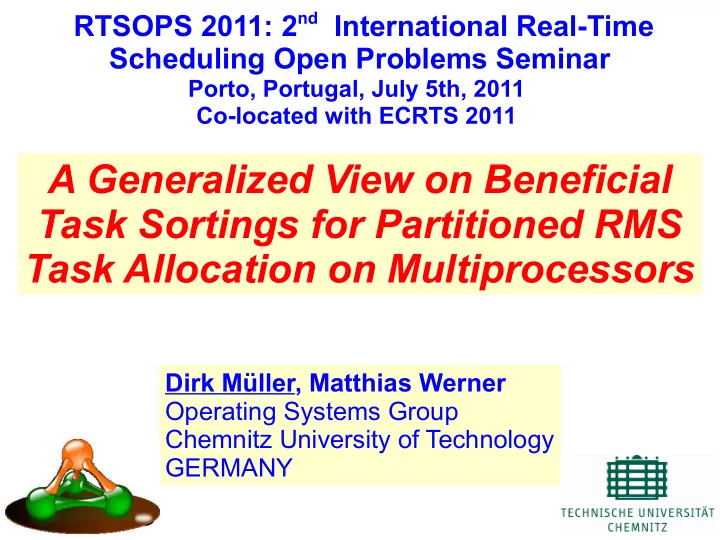

RTSOPS 2011: 2 nd International Real-Time Scheduling Open Problems Seminar Porto, Portugal, July 5th, 2011 Co-located with ECRTS 2011 A Generalized View on Beneficial Task Sortings for Partitioned RMS Task Allocation on Multiprocessors Dirk Müller, Matthias Werner Operating Systems Group Chemnitz University of Technology GERMANY
Partitioned RMS ● Partitioned Scheduling as resort to multiple unipro- cessor scheduling problems (easy) and allocation ● Allocation closely related to Bin Packing, NP-hard ● Use of online heuristics like Next Fit , First Fit , Best Fit ● Schedulability test (“Fit”) for RMS complicated RMS ● TDA is exact, but pseudo-polynomial ● Sufficient tests RMS pessimistic Allocation Online stream of tasks Heuristic (e.g. NF, FF, BF) RMS Admission Control (e.g. TDA, LL, HB, RMS R-BOUND, Burchard) D. Müller, M. Werner: Beneficial Task Sortings for Partitioned RMS 07/05/2011 2/7
Sorting as Preprocessing ● Offline situation: permutation of tasks in order to in- crease success rates of allocation ● Re-use of established online schedulers ● Restriction of input space to sorted instances ● Most famous: Decreasing Utilization (DU) RMS known from bin packing as e.g. FFD Task set (First Fit Decreasing) (offline) RMS Allocation Presorting Online stream of tasks Heuristic (e.g. DU) (e.g. NF, FF, BF) RMS Admission Control (e.g. TDA, LL, HB, RMS R-BOUND, Burchard) D. Müller, M. Werner: Beneficial Task Sortings for Partitioned RMS 07/05/2011 3/7
Problem Statement: Sorting Criteria ● DU is optimal for EDF as FFD is for pure bin packing ● Is there an optimal sorting sequence for the prepro- cessing step in partitioned RMS heuristics? ● Systematization and generalization ● One-stage ● Decreasing utilization ● Increasing (transformed) period ● Increasing S-value with S = log 2 p − ⌊ log 2 p ⌋ ● Two-stage ● 1. decreasing utilization, 2. increasing S-values – RMGT (Burchard et al. 1995) – RMMatching (Rothvoß 2009) – k-RMM (Karrenbauer & Rothvoß 2010) D. Müller, M. Werner: Beneficial Task Sortings for Partitioned RMS 07/05/2011 4/7
A Common Root of RMST and R-BOUND-MP ● RMST (Burchard et al. 1995) vs. R-BOUND-MP (Lauzac et al. 1998) ● RMST with increasing S-values S i = log 2 p i − ⌊ log 2 p i ⌋ ● R-BOUND-MP transforms with ScaleTaskSet to same- order-of-magnitude periods, then increasing periods p i ' = p i 2 ⌊ log 2 ( p max / p i ) ⌋ ● Logarithmization to base 2 is strictly increasing => order-preserving operation log 2 p i ' = log 2 p i + ⌊ log 2 p max − log 2 p i ⌋ ● max. period as a constant yielding an index shift p max D. Müller, M. Werner: Beneficial Task Sortings for Partitioned RMS 07/05/2011 5/7
Example i 1 2 3 4 5 6 7 8 9 10 p i 7 16 21 32 48 64 66 75 96 100 p i ' 56 64 84 64 96 64 66 75 96 100 p i ' rank 1 2 7 3 8 4 5 6 9 10 S i 0.807 0.000 0.392 0.000 0.585 0.000 0.044 0.229 0.585 0.644 S i rank 10 1 6 2 7 3 4 5 8 9 ● Ties are broken by index p i ' = S i mod 10 + 1 ● ● Results differ just by an index shift ● Circular relationship suggests that there is no out- standing starting point => consider all index offsets in the general case D. Müller, M. Werner: Beneficial Task Sortings for Partitioned RMS 07/05/2011 6/7
Summary ● Sorting as preprocessing for partitioned RMS is a key step for increasing success ratio when scheduling ● Decreasing utilization is optimal for partitioned EDF and a good starting point for partitioned RMS, but not optimal since it ignores period compatibility completely ● Previously thought of independent approaches RMST and R-BOUND-MP have a common root concerning sorting sequence (S-values describe period similarity) ● Shows potential for generalizations ● Recent results suggest superiority of two-stage approaches with 1. decreasing utilization and 2. increasing S-values D. Müller, M. Werner: Beneficial Task Sortings for Partitioned RMS 07/05/2011 7/7
Recommend
More recommend